Share
Main Conclusions
5 key takeaways

Most mid-market companies consider “ the reduction of GHG emissions “important” or “critical”, ( 84%, of which 71% perceive it as an opportunity).
Beyond reducing their climate impact, respondents foresee concrete economic opportunities from their transition (e.g., improving cost efficiency, addressing new markets, and benefiting from state support to modernize facilities and equipment). A vast majority of them even consider that the climate transition will trigger an immediate or long-term competitive advantage.
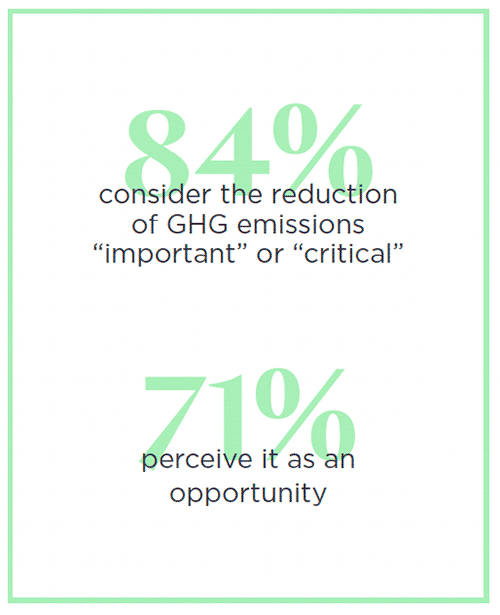

However, a limited share of companies (38%) declares having already “strongly invested”. These investments were primarily driven by regulation, energy prices, and customer pull.

For a vast majority of companies, actions to reduce emissions are still being deployed ad-hoc and opportunistically. Only 11% declare having “strongly invested” based on a structured decarbonisation plan,
including measuring their GHG emissions baseline and building a roadmap. There is still a long way to go for European mid-market companies to tackle all opportunities that could arise from climate transition.
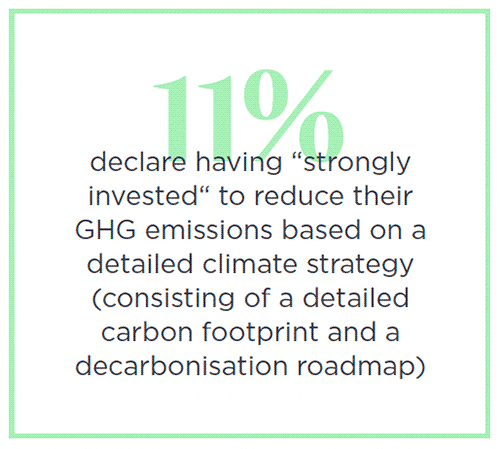

Mid-market companies have started to act on decarbonisation across all European regions studied; however, different decarbonisation dynamics can be observed between sectors and ownership.
For instance, 51% of Transportation & Logistics companies declare to have significantly invested, versus only 24% of High-temperature Industries. By ownership, 62% of publicly listed companies declare having “strongly invested” versus only 35% for privately-owned companies.

European mid-market companies are optimistic about the achievability of 2030 targets (70% declare that they seem achievable), while they need external support to overcome 3 main headwinds:
lack of financial resources, regulation complexity, and lack of time and expertise.
- Financial headwinds: Investors have a crucial role to play in supporting mid-market companies in the implementation of decarbonisation investment projects, by helping management navigate the complexity, provide tools and guidance, support decarbonisation initiatives and accept longer term returns for climate related projects;
- Regulatory complexity: EU regulators are at the vanguard of environmental measures. However, beyond increased reporting, mid-market companies do not necessarily perceive a clear signal and incentives on decarbonisation. More clarity on the role of of mid-market companies in the EU climate strategy and dedicated measures to support them would help accelerate the transition.
- Lack of time and expertise: Mid-market companies rarely have the necessary internal resources nor expertise to deliver ambitious decarbonisation roadmaps. Engagement of all stakeholders (regulators, investors, governmental agencies, business partners, solution providers(1)) addressing the specific needs of of mid-market companies is critical to the success of their decarbonisation initiatives.
Most mid-market companies consider “important” or “critical” the reduction of GHG emissions (84%, of which 71% perceive it as an opportunity)

There is a high awareness among European mid-market companies across all regions and sectors as 84% consider the reduction of GHG emissions “important” or “critical”.
Among this 84% of respondents, 69% declare that they are already working on GHG emissions reduction as an environmental objective. The abatement of their GHG emissions is a top priority together with pollution prevention and control, despite a less mature regulatory framework compared to already applicable regulations regarding air quality such as the IPPC (Integrated Pollution Prevention and Control) European directive.
Environmental objectives of interviewed companies
(for companies who considered the reduction of GHG emissions “important” or “critical”)
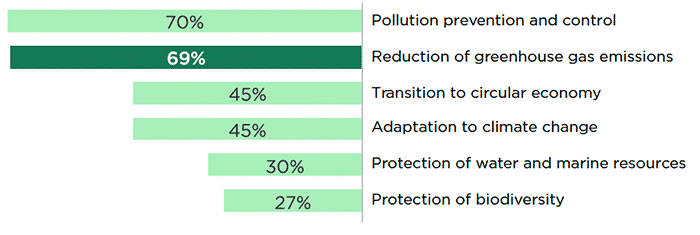
Among this 84% of respondents considering GHG emission reduction “important” or “critical” a high share (71%) see the climate transition as an opportunity. Perceived opportunities include improving cost efficiency, addressing new markets, and benefiting from state support to modernize facilities and equipment.
Perception of the climate transition
(for companies who considered the reduction of GHG emissions “important” or “critical”)
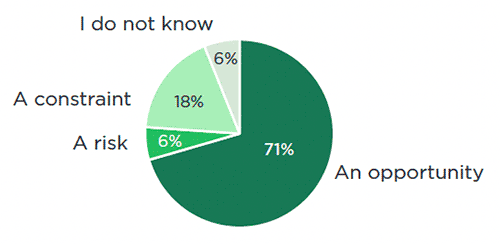
There are notable differences in how the climate transition is perceived by region: 86% of Italian companies perceive it as an opportunity versus 73% for France, 63% for Germany and 60% for the Benelux.
Perception of the climate transition, by region
(for companies who considered the reduction of GHG emissions “important” or “critical”)
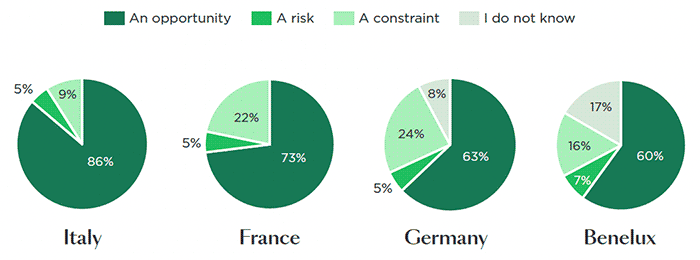
Additionally, a vast majority (76%) of those considering GHG emission reduction important believe that the climate transition will trigger an immediate or long-term competitive advantage.
However, a limited share of companies (38%) declares having already « strongly invested », primarily driven by regulation, energy prices, and customer pull – few respondents saw opportunities appealing enough to motivate paradigm shifts

38% of respondents declared that they had already «strongly invested» in GHG emissions reduction, while 41% declared having already deployed financial resources targeting the easiest actions.
Levels of investments deployed in GHG emissions reduction
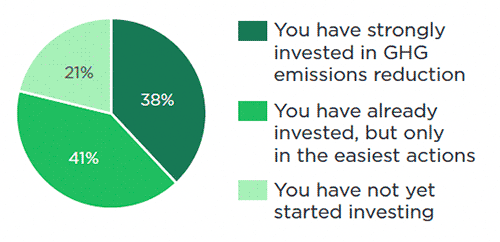
The two main drivers to start acting on decarbonisation are regulatory changes and energy prices. 70% of respondents mention regulatory changes as a driver, with new regulations being introduced and implemented at European and domestic levels, both across sectors and industry specific. The current energy crisis is also a major decarbonisation driver across all sectors (60% of respondents).
Decarbonisation drivers
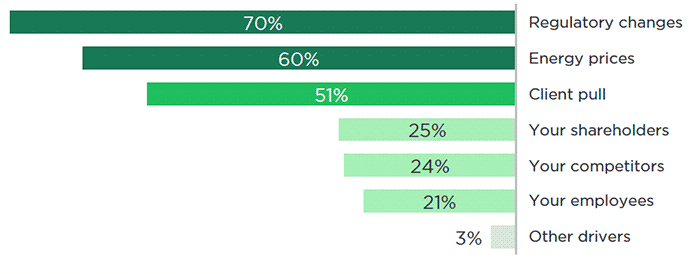
The third main driver, client pull, is quoted by 51% of respondents as a motivation to start acting on decarbonisation and is perceived as such across all sectors with pressure coming from both B2B and B2C clients.
% of respondents quoting “Client pull” as a decarbonisation driver (by % of B2B turnover)
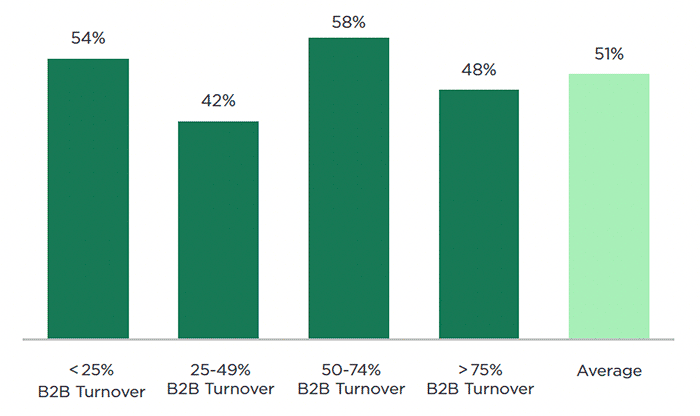
When looking at the decarbonisation actions taken over the last 12 months:
- Companies have been primarily focusing on the two most obvious and more easily actionable levers, as quoted by more than 70% of the respondents: implementing energy efficiency measures and raising employee awareness.
- Three levers have moderate adoption rates but were present across all industries and region considered: switching to lowcarbon energy, selecting greener suppliers or distributors, and bringing change to production tools. These three have a strong impact on the operating model across the value chain (e.g., suppliers and production tools)
- Finally, respondents have taken less action on more transformative actions which directly impact products/ services sold, like modifying the final product and changing their business model. Activating those transformative levers require heavier investment as well as more time and resources for strategic planning and implementation.
Decarbonisation levers used by respondents over the last 12 months
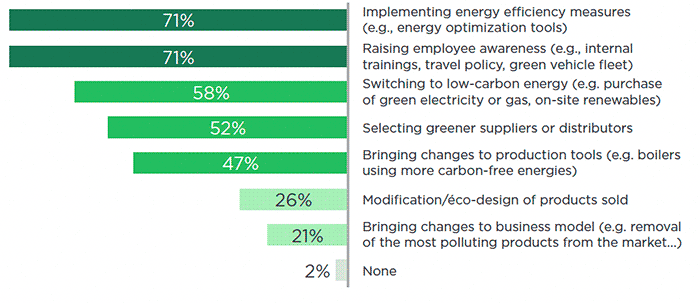
For a vast majority of companies, actions to reduce emissions are still being deployed opportunistically, as only 11% have started to invest significantly based on a structured decarbonisation plan

Different behaviours were observed in European mid-market companies’ approach to decarbonisation. These can be consolidated in 4 “paths to decarbonisation”, depending on whether companies measure their carbon footprint, build a roadmap, and start to deploy strong investments. Only 11% of the respondents declare having “strongly invested” to abate their GHG emissions based on a structured decarbonisation plan (including measuring their GHG emissions baseline and building a strategic roadmap). The European mid-market companies still need support in measuring and strategic planning for embracing all the opportunities that may arise from the decarbonisation.
4 paths to decarbonisation
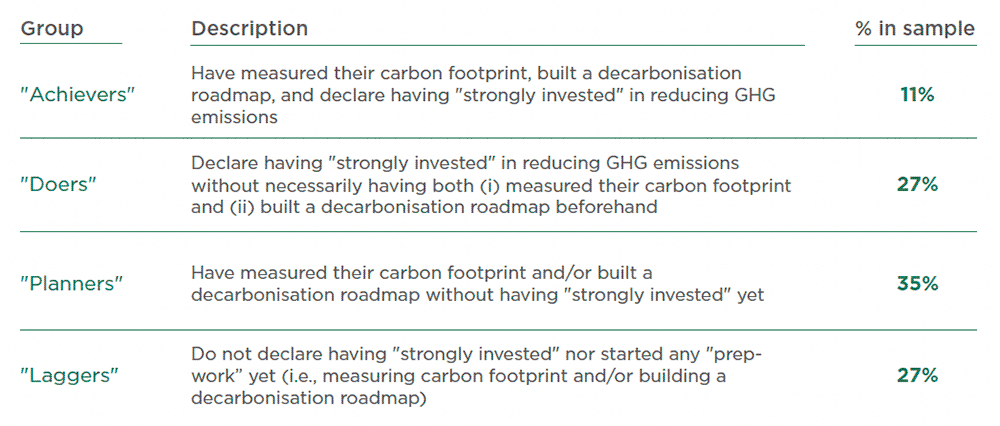
Amongst the 62% of companies which declare not having “strongly invested” in decarbonisation yet (35% of «Planner» and 27% of «Laggers») more than half have done at least one of the 2 steps of climate strategy planning (measuring carbon footprint and/ or building a decarbonisation roadmap). This paves the way for upcoming investments in climate transition.
For context, large companies have been required by EU’s NFRD (Non-Financial Reporting Directive) to track and publish their ESG performance since 2017. Starting 2024, the new CSRD (Corporate Sustainability Reporting Directive) will mandate similar reporting to a broader spectrum of companies starting with larger ones and then extending to SMEs
Mid-market companies have started to act on decarbonisation across all European regions studied; however, different decarbonisation dynamics can be observed between sectors and ownership

The share of mid-market companies who declares having « strongly invested » in abating their GHG emissions is exceeding 33% in all regions studied. This highlights the homogeneity of decarbonisation dynamics across regions, notably pushed by the EU Green Deal and common environmental regulations across the EU.
Share of respondents declaring having « strongly invested » in decarbonisation

Differences between sectors are more significant though, with only 24% of respondents of the High-temperature industries declaring having « strongly invested » in decarbonisation, vs. 51% in Transportation & Logistics.
Share of respondents declaring having « strongly invested » in decarbonisation
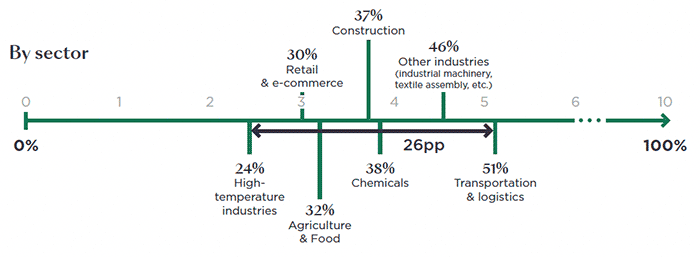
When analysing dynamics per kind of ownership, variations again are significant. Private companies clearly lag behind their listed peers, highlighting the impact of stricter environmental reporting requirements that listed companies have been subject to for many years. All stakeholders now carry the responsibility to push private companies towards decarbonisation.
Share of respondents declaring having « strongly invested » in decarbonisation

European mid-market companies are optimistic about the achievability of 2030 targets (70% declare that they seem achievable) while they need external support to overcome 3 main headwinds

When asked about the efforts related to the climate transition required by 2030, almost 70% of respondents declare that they seem achievable. However, within these, 78% also mention that the achievability of their goals will depend on external stakeholders.
European mid-market companies face three main headwinds to their climate transition which all appear at the same level among respondents: (i) financial headwinds (i.e., level of investments required combined with the difficulty to get access to the necessary funding and uncertain return on investment), (ii) regulatory complexity, and (iii) lack of time and expertise.
Headwinds to GHG emissions reduction
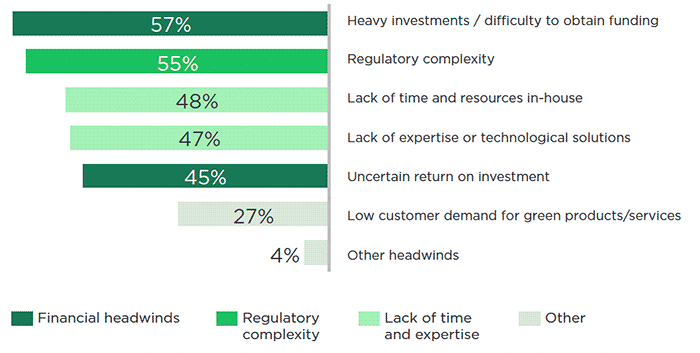
To mitigate the financial headwinds mentioned by respondents, investors have a crucial role to play in supporting mid-market companies in the implementation of decarbonisation investment projects. They can guide management navigate the complexity, provide tools and guidance, support decarbonisation initiatives and accept longer term returns for climate related projects.
To alleviate regulatory complexity, EU regulators have a critical role to play to trigger climate action of mid-market companies. Regulators need to balance the EU leading climate ambition with regulatory simplicity. More clarity on the role of mid-market companies in the EU climate strategy and dedicated measures to support them would help accelerate the transition.
Finally, contrary to large companies, mid-market companies rarely have sufficient scale to hire the necessary internal talents nor to develop in-house expertise and deliver ambitious decarbonisation roadmaps. Engagement of all stakeholders (regulators, investors, governmental agencies, business partners, solution providers (1)) addressing the specific needs of mid-market companies is critical to the success of their decarbonisation initiatives.











